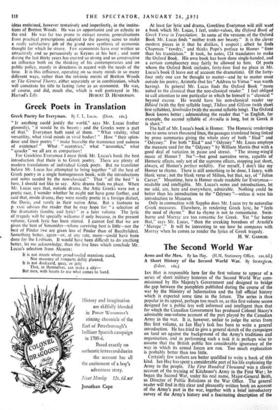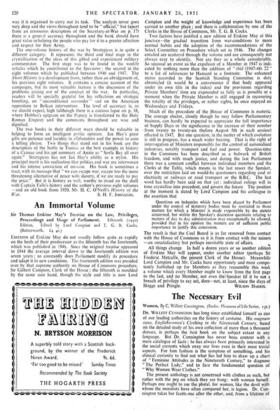The Second World War
IAN HAY is responsible here for the first volume to appear of a series of short military histories of the Second World War com- missioned by His Majesty's Government and designed to bridge the gap between the pamphlets published during the course of the war by the Ministry of Information and the full official history which is expected some time in the future. The series is thus popular in its appeal, perhaps too much so, as this first volume seems designed for a public less well informed and intelligent than that for which the Canadian Government has produced Colonel Stacey's admirable one-volume account of the part played by the Canadian Army in the war. It is, however, unfair to judge the series from this first volume, as Ian Hay's task has been to write a general introduction. He has tried to give a general sketch of the campaigns on land set against the background of the Army's traditions and organisation, and in performing such a task it is perhaps wise to assume that the British public has considerable ignorance of the way in which its armed forces are run. Too much explanation is probably better than too little.
Certainly few authors are better qualified to write a book of this kind. Ian Hay has spent a considerable part of his life explaining the Army to the people. The First Hundred Thousand was a classic account of the training of Kitchener's Army in the First War ; he began the Second War, under his real name, Major-General Beith, as Director of Public Relations at the War Office. The general reader will find in this clear and pleasantly written book an account of the Army's part in the war, together with a brief introductory survey of the Army's history and a fascinating description of the
way it is organised to carry out its task. The analysis never goes very deep and the views throughout tend to be " official," but (apart from an erroneous description of the Secretary-at-War on p. 17) there is a general accuracy throughout and the book should have great value in helping the people who pay for it to a greater affection and respect for their Army.
The one-volume history of the war by Strategicus is in quite a different category. It represents the third and final stage in the crystallisation of the ideas of this gifted and experienced military commentator. The first stage was to be found in the weekly articles which he contributed to the Spectator; the second in the eight volumes which he published between 1940 and 1947. The Short History is a development from, rather than an abridgement of, his previous eight volumes. It contains a concise account of the campaigns, but its most valuable feature is the discussion of the problems arising out of the conduct of the war. In particular, readers will be specially grateful for his reflections on strategic bombing, on " unconditional surrender " and on the American opposition to Balkan intervention. The level of accuracy is, as we should expect, high (although there is a curious lapse on p. 16, where Hobbes's epigram on the Papacy is transferred to the Holy Roman Empire) and the comments throughout are wise and dignified.
The two books in their different ways should be valuable in helping to form an intelligent public opinion. Ian Hay's great gifts are patience and lucidity in explanation and the power to coin a telling phrase. Two things that stand out in his book are the description of the battle in Tunisia as the best example in history of a Cannae and his apt summary of Anzio as " Suvla Bay all over again." Strategicus has not Ian Hay's ability as a stylist. His principal merit is his realisation that politics and war are interwoven and his intense conviction of mission. His book is sometimes a tract, with its message that " we can escape war, escape too the more threatening alternative of peace with slavery, if we are ready to pay the price." But it is history as well, worthy to stand on the shelf with Captain Falls's history and the author's previous eight volumes —and an old book from 1920. Mr. H. C. O'Neill's History of the







































 Previous page
Previous page